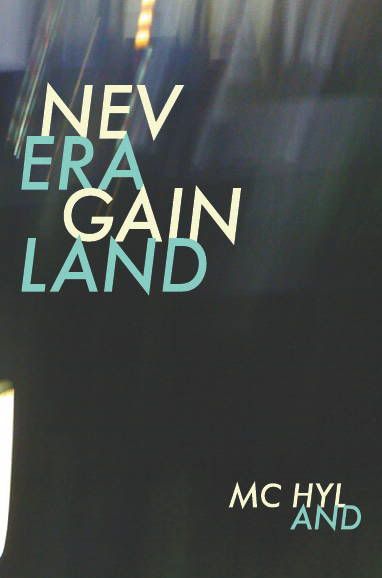
The confluence of body and poem, or flesh and word, is a primary concern in MC Hyland’s book Neveragainland. In the opening poem “Diegetic,” the speaker says: “This is / a sheet of paper, with a memory of skin // it clothed”; the fact that “paper,” or the page, contains “a memory of skin,” as opposed to skin itself, I think, offer s bit of insight into the complexities of the body-poem dyad, at least to the extent that “paper” is the sight of the poem and “memory” is a trace (in the Dierridian sense?) of the body: almost as if the blank page presupposes the poetic embodiment. Of course, once the poem becomes body, or the body is realized in the poem, the relation remains influx or curious, as in the poem “Bird, How Beautifully You Sing!” when the speaker claims: “This other world on you, your body fits you strange.” In many ways, “This other world,” which is word, does “fit” the body, but “fits” it strangely; and within this strange fitting the tragic resides, most notably voiced in the “Ballet Méchanique” series, wherein we find the speaker “had lost interest in the body” because or due to the fact that the “body is an emptiness bruised by sound.” But, it would appear, such “emptiness” created by “sound” is not permanent or irredeemable. In fact, if we wait “all night,” perhaps the “body” will “rise again” if we “allow the air to come toward” us. Or, perhaps stated differently, if we allow the air to come into us, via the mouth (i.e. the voice), and to be vocalize through the language of the poem, a cry toward the heavens wherein we are “calling our names / up to the oranged night sky” can be articulated. Might this cry be a symbolic (or real) gesture upward toward the infinite poem, which is the “emphatic expletive / of indefinite meaning” as we “rise / always into language”? By the very nature of the poem and its “indefinite meaning,” one cannot say for sure; it will always remain, to some extent, ineffable. But what we can be certain of is that the communion of body and word is always prescient, as in “Dear ________,” when we find that: “By the time I finished writing, you had disappeared inside me.” Is “you” the writer? The poem? Some imagine other? All of these? It probably matters little, but what is important is “you’s” entrance into and eventual indecipherable union with the body. In the end, the mingling of the body and the word, very literally makes “your mouth / a round word,” which is an instance of “Using your body as a well,” or using your body well. All this, of course, says nothing of the poem “Residential, As In,” which further conflates the word and body with the trope of the house or building, so much so that one finds an “abandoned text of the front / door” that is “syntactic & wooden,” while simultaneously “the body” as “residential” “responds to this homing and light”: another way to say that “the body's turning / in on itself” are “these stanzas. / little rooms”: body, poem, and house as one.

No comments:
Post a Comment